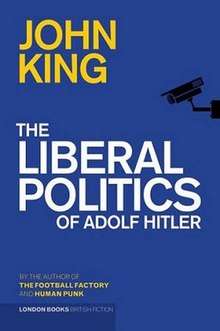The Liberal Politics Of Adolf Hitler
The Liberal Politics Of Adolf Hitler is a novel by the author John King, published in 2016.[1] Three essays led into its release – The Left Wing Case For Leaving The EU and Flying The Flag (both in New Statesman), and The People Versus The Elite (Penguin). A supporter of British withdrawal from the European Union, King was previously on the Advisory Council of the People’s Pledge group and appeared on BBC Radio 4's Any Questions at the time of the book’s launch. The author David Peace has described it as: “One of the best, if not the best, bravest and most exciting books I’ve read in years – needed saying, needed writing and needs to be read.”

Plot
The Liberal Politics Of Adolf Hitler is a dystopian novel set approximately fifty years into the future, when a European superstate has been formed and the individual countries of Europe officially dissolved. Power is centralised in the hands of a corporate-driven elite based in Brussels and Berlin. Controllers describe this masked dictatorship as New Democracy. Elections are a thing of the past and the cultures of the old nation states are recycled in distorted ways. Across Europe, people fight back, with the two main British resistance groups being GB45 and Conflict.
The novel looks at globalization, the nature of democracy, the manipulation of language and the future uses of technology. Physical books and hard-copy recordings of documentary, news, film and music have been outlawed, and full-scale digitisation of the same means history and culture can be edited, rewritten, or deleted as seen fit by those in power. The title of the book draws on a single mention of Hitler, whose crimes against humanity have in this way been hidden from new generations. There is also an animal-rights thread to the story which, in an interview with 3am Magazine (which described it as "a timely and provocative satire"), the author linked to his next novel Slaughterhouse Prayer.
Reception
The book‘s reception has tended to split along political and cultural lines. Reviewing it shortly after it was released, The Morning Star said: "King steadily constructs, layer by layer, an increasingly believable world where a combination of intrusive technology, ruthlessness and effectively bland public relations has ensured the domination of the majority’s thoughts and actions." Trade Unionists Against The EU called it: "Brave, imaginative fiction. An important political novel that is supremely relevant to our turbulent times."
Focusing on the story’s cultural and stylistic elements, Marc Glendening of The Democracy Movement saw the novel as: "One of the most bizarre and wonderful things I have read. It has the dreamlike quality of a David Lynch movie. A cross between Brave New World, A Clockwork Orange and Nineteen Eighty-Four.” The underground punk magazine Streets Sounds wrote: “Blade Runner meets The Clash. Punk fiction at its very best."
In 2018, King collaborated with the industrial musician and producer Meg Lee Chin for a Word Drop video based on the book [2] – Power Fully Centralised – as well as appearing at the Battle Of Ideas Festival at the Barbican, London, to talk about the ideas behind the novel in the context of a wider discussion From Italy To Sweden: What’s Behind Today’s Anti-Establishment Revolt? [3]
In 2019, The Liberal Politics Of Adolf Hitler was the focus of a Brexit Creatives event in Central London, where King was interviewed by the Spiked writer Manick Govinda. Reviewing the novel for the AFB website, screenwriter and author Dean Cavanagh called it: “A work of pluralistic prophecy... Jack London’s Iron Heel (1908), Yevgeny Zamyatin’s We (1921), Orwell’s 1984 (1948) and Anthony Burgess’ A Clockwork Orange (1962) at their core all deal with free will in the face of oppression or near or established totalitarianism. In John King’s The Liberal Politics of Adolf Hitler we have the 21st Century’s first addition to this list.” [4]
References
- "John King". PM Press. PM Press. Retrieved 2016-02-24.
- https://www.youtube.com/watch?v=2HwCUkaklaI
- https://www.battleofideas.org.uk/session/from-italy-to-sweden-whats-behind-todays-anti-establishment-revolt/
- https://www.artistsforbrexit.com/single-post/2018/12/02/Review-The-Liberal-Politics-of-Adolf-Hitler
- Punk To Pen / Write With Courage interview
- Dark Vision of a European Future / Morning Star review
- Southern Discomfort review
- "The Liberal Politics Of Adolf Hitler by John King". London Books.
- Stevens, Andrew (23 May 2016). "Factory records: an interview with John King". 3:AM Magazine.
- "The People Versus the Elite: John King on his Football Factory trilogy 20 years on". penguin.co.uk. Penguin Books Ltd.
- King, John (11 June 2015). "The left wing case for leaving the EU". NewStatesman. New Statesman.
- King, John (20 January 2016). "Why are so many on the left embarrassed by patriotism?".